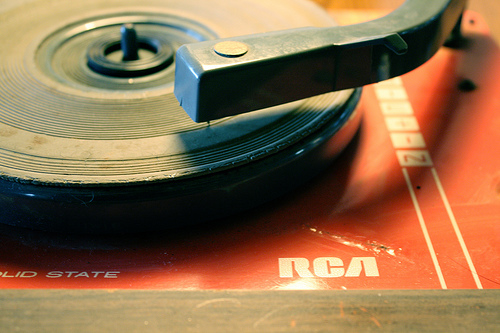Would you pay for access to millions of digital books?

I'm reading article after article about the X number of great bands from SXSW I should be checking out. I scan the articles looking for my friend's band name, checking if she's got the recognition I think she deserves. Most of the time I don't recognize any of the names. Sometimes I see hers.
But overall it gets me thinking- there is so much new music out there, how could I ever listen to it all? It's a tough question. In one sense, I can't. There's just too much.
But in another sense, if I want to check out a bunch of new music, I can go to YouTube and search. I can look up the band's website and hear some samples. Or I can turn to Spotify, where I can listen to just about anything for free with ads, $4.99 on one device without ads, or $9.99 on any of my devices with no ads. Maybe you have Spotify. Maybe you know this. Maybe you know that for $120 a year you can have access to millions of songs anywhere and anytime you want.

Erin Griffith wrote a great piece about the argument around fair pricing and payments from a digital streaming service like Spotify. I can't get into all the specifics of her nuanced assessment of the sides, but here is a basic summary of the premise. She writes:
In one corner is a music industry that’s lost two thirds of its value in the last ten years. In the other, a crop of digital streaming companies aiming to change the way people consume music. In the middle are the artists and the government.
It's a tough situation. The music industry continues to lose market share, the digital services continue to get better at slick and speedy distribution, and the creators and the legislators are just trying to keep up and figure out what to do.
About now you're probably wondering, "I thought this article was about books?..."
Digital books
It is. Digital books are not far behind this kind of a reality. At the last conference I attended, a whole panel of people was dedicated to talking about the coming age of what they literally called "The spotify for books." It won't be exactly the same, of course, but the general idea will be there.
A reader will pay a monthly fee to have access to millions of books. It sounds pretty amazing if you're a reader. It's like the Kindle Lending Library, only for everything that I want, not just for stuff I haven't heard of or already read.
How much would you pay per month for access to any book you wanted to read?
I try to think about that solely as a reader, not an author, and I get about the same amount that Spotify charges for music. $4.99. I think I would be willing to pay five bucks a month to have access to any book, any time.
You?
Enter Oyster, 24Symbols and Bookboard
You haven't heard of Oyster yet, but you will. They are the closest to creating this mythical spotify for books. And if it's not them, it'll be 24Symbols, dubbed Pandora for EBooks. Or maybe Bookboard, being called Netflix for books. You get the idea.
All of these new services are taking some angle on the idea of offering a huge library of books to readers for download or streaming based on a monthly rate.
It's coming.
A recent survey a firm did of UK readers, asking readers exactly what they would pay for this kind of service.
61 percent said they would pay under £5 (about $7.50)
33 percent said £5 - £10 per month (up to $15.00)
Sounds a lot like what Spotify is charging people to listen to whatever music whenever and wherever they want.
The future
So if it's coming, the big question is how will the royalties shake out? Even right now authors don't get much for royalties from traditional publishers, and any revenue from a streaming platform like these is going to be lower than straight sales revenue, no matter how much it keeps shrinking.
That question I can't answer.
All I can say is, if you are an eBook aficionado, the time is coming soon where you'll see all of the titles you want to see in one place, and probably be able to get them for about the price per month as it costs you to get a cup of coffee and a pastry.
What do you all think about the coming streaming of books? How should authors and/or publishers be compensated?
Images courtesy of SeAMK Korkeakoulukirjasto via flickr and cerebro Hermano also via flickr

3 comments